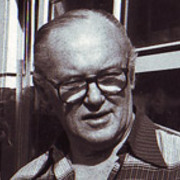
John O'Shea
John Dempsey O'Shea, OBE, was a dedicated film lover and consummate practitioner of the medium. He championed an independent New Zealand film industry from the beginning of his career until his death in 2001, aged 81. He co-directed the first New Zealand feature after World War II, Broken Barrier. Later O'Shea was the subject of this documentary, and published his part autobiography Don't Let it Get You.
Director Tony Williams, one of many who was mentored by O'Shea at company Pacific Films, called him "the only visible intellectual working in New Zealand film" over decades. "He wasn’t ‘arty’ or ‘underground’," wrote Williams. "Neither was he particularly ‘commercial’. He simply longed for an industry that would have its own New Zealand voice — not a Hollywood voice." Added fellow Pacific Films alumni Gaylene Preston: "He was the funniest, most vitriolic, the most literate, the most political, and by far the wiliest. He ran the place like an extended family."
Born in New Plymouth in 1920, O'Shea grew up there and in Wanganui with a Kiwi mother, and a father who had arrived from Ireland as a small boy. As a teen, a sports injury allowed him to skive off school cadet drills to the local picture theatre.
He went on to study history in Wellington, where he was active in the local film society, and got a job as an assistant to the film censor. O'Shea met NFU cameraman Roger Mirams when Mirams was looking for a writer for a documentary about racial prejudice. O'Shea said later that he agreed, on condition "it was to be a feature drama and I could co-direct it with him". Mirams had started his own independent filmmaking company in early 1948, with fellow NFU defector Alun Falconer. When Falconer left New Zealand in 1950, the way was left clear for O'Shea and Mirams to lead the company together, which was soon to rename itself Pacific Film Productions.
And so the duo co-directed and produced Broken Barrier, the story of the relationship between a Pākehā journalist and a young Māori woman. Lacking the ability to record sound, apart from a few specific scenes, O'Shea cleverly constructed the script so that each character's thoughts were heard as a voice-over.
Broken Barrier premiered in 1952. It was the first New Zealand feature since World War II. Only two other features emerged between 1945 and 1970, both directed by O'Shea.
By 1957 both of Pacific's original founders had left to pursue moviemaking overseas. Over the next three decades, O'Shea's name would become synonymous with Pacific Films. The company produced newsreels, training films, sponsored documentaries, road safety films, television commercials and sports events, including every All Black test between 1956 and 1962.
The second and third Pacific features followed later that decade: man alone meets European-cinema mood piece Runaway (1964; released in England in severely shortened form as Runaway Killer) and the considerably lighter and better received road movie Don't Let it Get You (1966), which showcased the musical talents of Howard Morrison, Lew Pryme, and Kiri Te Kanawa.
Pacific Films became a fertile training ground for young filmmakers, "a sort of alfresco film school", as O'Shea put it. Many of the staff — including directors Barry Barclay, Gaylene Preston and Tony Williams, and cinematographers Michael Seresin and Waka Attewell — went on to win renown. After extended banging on the door of local television by O'Shea, Pacific's team were commissioned to contribute to TV documentary slot Survey, where Williams' talents quickly shone.
In 1974 John O'Shea and Pacific Films produced landmark documentary series, Tangata Whenua (The People of the Land). The six-part series, written and presented by historian Michael King and directed by Barry Barclay, was highly significant in terms of introducing a sophisticated representation of Māori culture to television. O'Shea regretted never getting a companion series off the ground, which would have explored 'Pākehātanga'.
In 1987 O'Shea produced Tama Poata and Barclay's lyrical Ngati, the first feature written and directed by Māori. The film received national and international critical acclaim. In preparation for the film Barclay, upset at the lack of young Māori in the screen industry, arranged training for 25 people to do a two month crash-course and make short film Ka Mate! Ka Mate!. Half of the trainees went on to work on Ngati. Sadly Barclay's follow up movie Te Rua would see director and producer in conflict over the shape of the finished film, and who it was being made for.
O'Shea continued to play a part in the evolution of NZ film and television. He was a founding member of both Ngā Taonga (formerly the New Zealand Film Archive) and the NZ Film Commission, an organisation he was not afraid of critiqueing on occasion.
In 1990 John O'Shea received an OBE for his services to the film industry; in 1992 he received the first Lifetime Achievement Award presented by the NZ Film Commission. The following year he was the subject of this documentary by Bryan Bruce.
John O'Shea passed away on 8 July 2001. Former Pacific Films director John Reid later wrote magnum opus Whatever It Takes: Pacific Films and John O'Shea 1948 - 2000.
Profile updated on 17 November 2022
Sources include
John O'Shea, Don't Let it Get You - memories - documents (Wellington: Victoria University Press, 1999)
Jonathan Dennis, '20 June 1920 - 8 July 2001: JOHN O'SHEA' SpadaNEWS(Broken link), July 2001 (No 64), Page 1
Helen Martin and Sam Edwards, New Zealand Film 1912 - 1996 (Auckland: Oxford University Press, 1997)
Gaylene Preston, 'John Dempsey O'Shea - A Tribute' - Illusions 33 (Autumn 2002)
Simon Vita, 'A life still rolling' (Interview) - City Voice, 5 August 1999, Page 13
Tony Williams, 'John Dempsey O'Shea - A Tribute' - Illusions 33, (Autumn 2002)